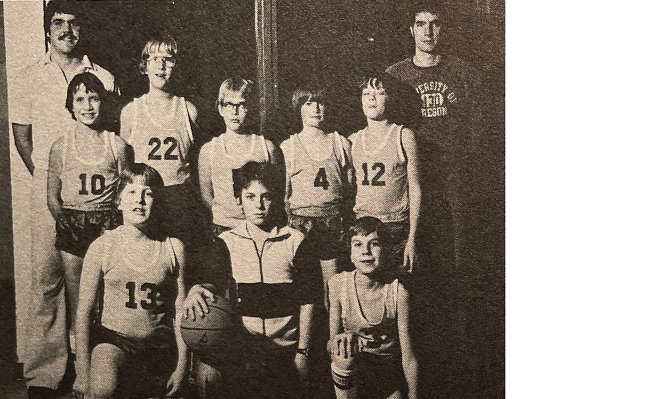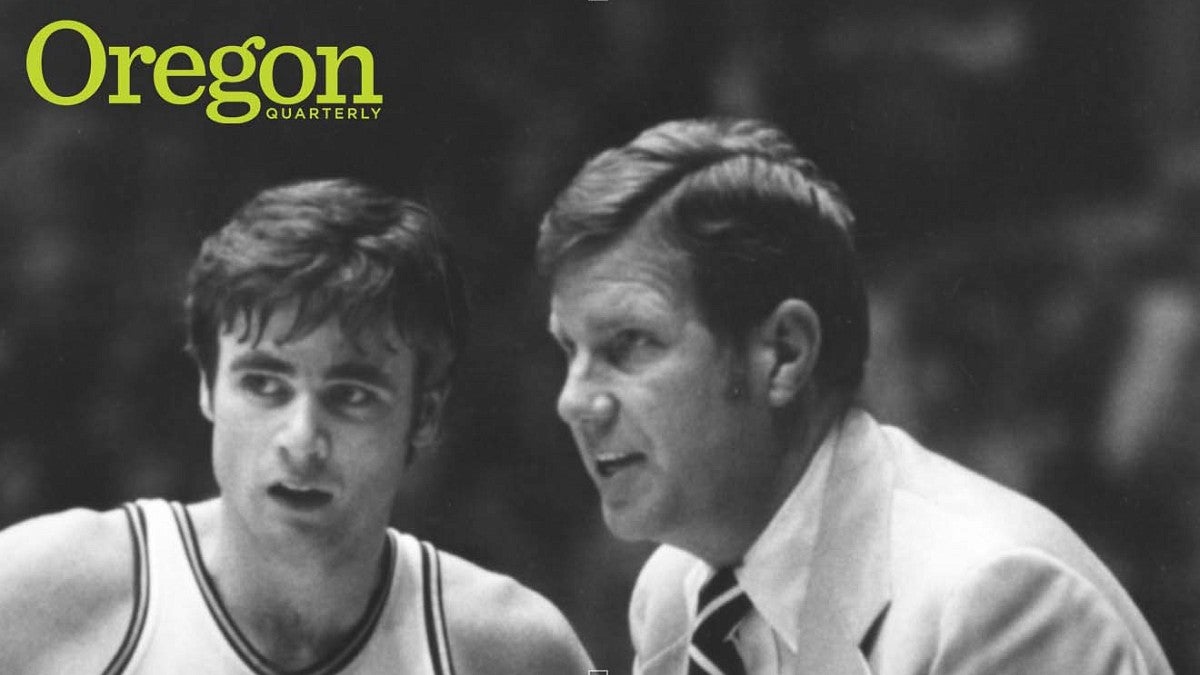When I left my hometown of Seattle to attend the University of Oregon in the fall of 1976, I fell in love with everything except the football team. I’d been a Husky fan since Sonny Sixkiller appeared on the cover of Boys’ Life, and the Huskies were one year away from going to the Rose Bowl in their third year under coach Don James. The Ducks, on the other hand, weren’t going anywhere anytime soon. In the first home game I went to, USC flattened them, 53-0. After wins against two mediocre Utah teams, they lost every other game, including all of their Pac-8 contests, until they managed to eke out a final 23-14 victory over the even-more-hapless Beavers. Even the mascot embarrassed me. How, I thought, can I root for a team called the “Ducks”?
Then came basketball season. In those days the university had a lottery system to buy a student pass to all sports events and I was fortunate to be selected. I say fortunate because, unlike the football team, the basketball Ducks were good. After narrowly losing their opener to UNLV, the No. 6 team in the country, they reeled off a succession of wins that included one of the biggest in Oregon basketball history: a 61-60 victory over the UCLA Bruins in Pauley Pavilion. (It was their second straight win in Pauley, where the Ronnie Lee-led Ducks had walloped the Bruins by 20 points the year before, ending their streak of 98 straight home wins and shocking the country.) When the rematch came in Eugene February 19, the Ducks were a decent 13-7 but the Bruins were an even better 20-3 and ranked No. 3. That was the first time I understood what the term “winning the lottery” really meant.
Seats weren’t reserved in the student section. If you wanted a good one, you had to sleep overnight outside Mac Court. And that wasn’t the only thing that made that game feel like a rock concert. My friends and I got there early and were in the first rush of fans into the arena in the morning, putting us in the lower level near the court. From the moment we all poured in, the energy in that aging building was electric. People talk about the upper level shaking during games in those days, supported as it was by only a few thin stanchions, but even the lower areas shook. The level of noise was the equal of any rock concert I’ve ever attended.
I’m 63 now and to this day I’ve never experienced anything quite like that game. Much as I loved watching football, basketball was my sport. In high school, I played it every chance I got. And when that game in that overheated arena was over, I was as covered in sweat from the stomping and cheering and sheer joy of it all as I’d been from any game I’d ever played. Because, you see, although the Ducks had lost Ronnie Lee to the NBA, they still had Greg Ballard and Ernie Kent and that pesky little guard Mike “Bulldog” Drummond, and in front of 10,500 delirious fans who never stopped shouting, they held the mighty Bruins to their lowest point total of the season, beating them 64-55. For the third time in a row, they had defeated the school that had won 10 straight conference championships and 10 of the last 14 NCAA championships. And in the sixth of Dick Harter’s seven years as their coach, they’d done it his way: by fighting harder and playing scrappier than anyone they faced.
The following year, when I was a seasoned sophomore, my buddy (and fellow Duck) Mark Thorne and I signed up to coach a team of 10- and 11-year-olds. Around the time the season began, I read an article on Harter in which he said your first win as a coach is better than every win you had as a player. It took me a while to find out if that was true. Our team was composed of kids who hadn’t been selected for a supposed “super team” meant to easily win the league. Thorney and I didn’t know that going in, but the kids did. They came into the first practice hanging their heads and thinking of themselves as losers. There was one kid, though—a slick ball handler with a nice shot and a good sense of the game. We can build a team around him, I thought—him and the example set by Harter. Maybe our kids wouldn’t be the most experienced or the most skilled, but they would outhustle everyone.

My conviction was put to the test right away. After only a couple of practices, we played our first preseason game and lost by 20. The second preseason game wasn’t much better. But then, in the season opener, we lost by only seven and I could see the kids starting to feel a win at some point might be possible. After four defeats, I experienced that feeling Harter had talked about: we won a close game in the final seconds and my heart, as Dr. Seuss might say, grew three sizes that day. It was exactly how Harter had said it would be: I felt happier for those kids than I’d ever been for myself as a player.
That team went on to win their last four games and make the league playoffs. On the way to the locker room after winning their first playoff game—against the team that had clobbered them in the preseason—they were singing “We Are the Champions.” They weren’t the champions yet, of course, and they wouldn’t be—they lost a close game in the second round—but they had earned some bragging rights (the so-called super team had lost in the first round). More than that, they’d learned to keep their heads up no matter how bad things seem. They’d learned to trust themselves and fight through adversity.
Dick Harter was often maligned by other coaches for how physical his players were, but I suspect the maligners were mostly people who hadn’t prepared their teams as thoroughly or taught their players as well to pay attention to the little things: loose balls, blocking out on foul shots, keeping their hands up and their feet moving on defense. Above all, Harter showed his teams how hard they had to work to win consistently. (Among the drills I heard he used was one in which his players had to hold bricks in the air as they ran up and down the bleachers.)
I graduated from the School of Journalism and Communication in 1980, two years after Harter moved on to Penn State. The school prepared me well for what has become a long career as a journalist, essayist, author, professor, and writing consultant. I’ve been published hundreds of times, but even now it’s the books, articles, and essays my students and mentees publish that thrill me most (including the piece on shooting victim Ahmaud Arbery in Runner’s World that earned one former student, Mitchell S. Jackson, a Pulitzer Prize in feature writing last year). Throughout my years as a professor at Columbia, Southern Illinois, and Portland State, I did my best to challenge my students while being supportive, too. And they often thanked me not only for showing them how hard they had to work to succeed but also how important it is to pay attention to the little things. All I was doing, really, was giving them a piece of coach Harter and that Ducks basketball team that beat the perennial national champions—the so-called super team—three times in a row.
Michael N. McGregor, BA ’80 (journalism), is the author of Pure Act: The Uncommon Life of Robert Lax and the curator of the website WritingtheNorthwest.com. He dedicates this essay to his basketball-playing nephew, Emmett Hoelscher. Visit michaelnmcgregor.com to learn more about him.
Photos Courtesy UO Libraries Special Collections and University Archives (Ducks basketball) and Michael N. McGregor


